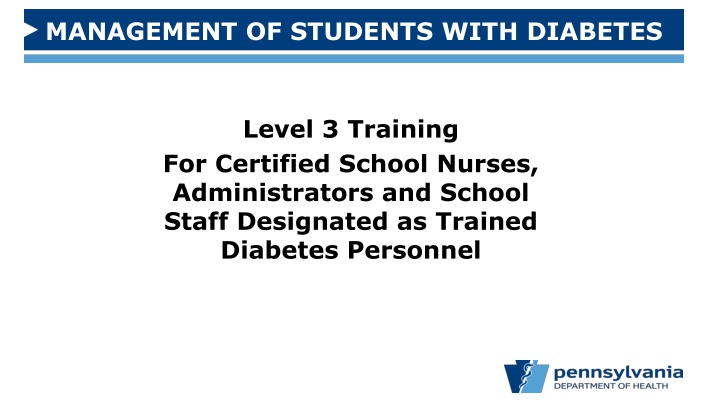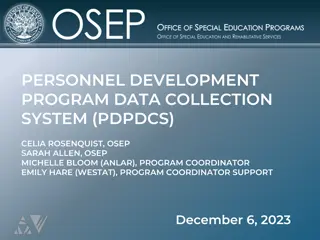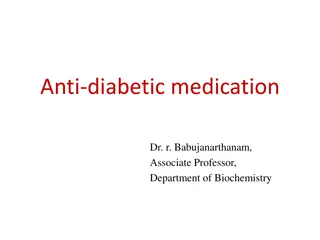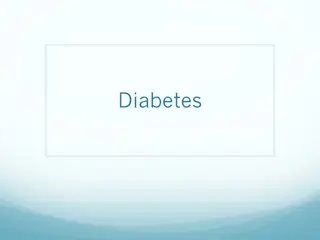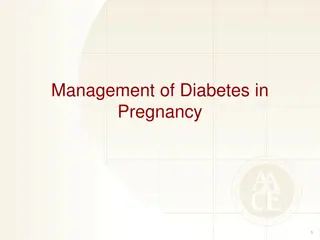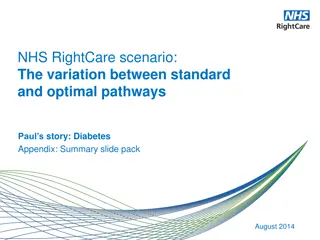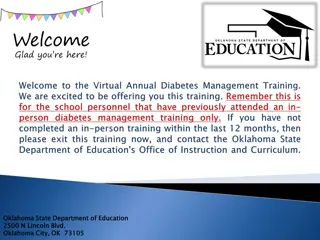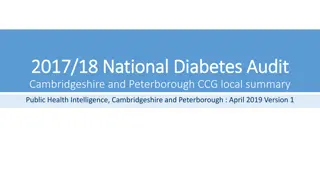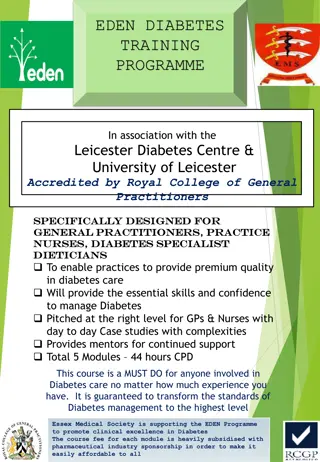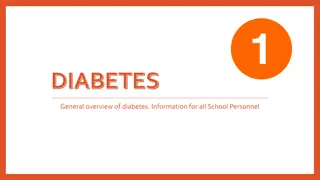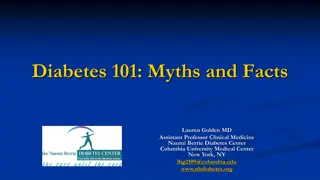Effective Diabetes Management Training for School Personnel
This training module focuses on managing students with diabetes in school settings, providing guidance on assembling a health team, creating student care plans, training staff, maintaining glucose control, self-management, recognizing and treating issues, administering medications, promoting physical activity, planning for events, handling emergencies, and addressing emotional challenges. The comprehensive approach ensures that school staff are well-prepared to support students with diabetes in various school activities and situations.
Download Presentation

Please find below an Image/Link to download the presentation.
The content on the website is provided AS IS for your information and personal use only. It may not be sold, licensed, or shared on other websites without obtaining consent from the author.If you encounter any issues during the download, it is possible that the publisher has removed the file from their server.
You are allowed to download the files provided on this website for personal or commercial use, subject to the condition that they are used lawfully. All files are the property of their respective owners.
The content on the website is provided AS IS for your information and personal use only. It may not be sold, licensed, or shared on other websites without obtaining consent from the author.
E N D
Presentation Transcript
MANAGEMENT OF STUDENTS WITH DIABETES Level 3 Training For Certified School Nurses, Administrators and School Staff Designated as Trained Diabetes Personnel
MANAGEMENT OF STUDENTS WITH DIABETES Adapted from: Diabetes in School Children: Recommendations and Resource Guide for School Personnel (2017) http://www.health.pa.gov/My%20Health/School%20Health/D ocuments/Chronic%20Disease/Diabetes/Final%20Diabetes_In _School_Children.pdf American Diabetes Association (ADA) Safe at School Campaign http://www.diabetes.org/living- with-diabetes/parents-and-kids/diabetes-care-at-school/
RECOMMENDED ANNUAL TRAINING MODULES All school personnel Level 1 Staff responsible for students with diabetes Level 1 and 2 Administration, nurses and school staff designated as trained diabetes personnel Level 1, 2 and 3
MANAGEMENT OF STUDENTS WITH DIABETES Diabetes management is 24/7. Routine care is required to meet daily needs. Emergencies can occur at any time. School staff must be prepared to provide diabetes care at school and all school- sponsored activities. The elements of effective diabetes management to be covered in this module are highlighted in yellow on the following slides.
ELEMENTS OF EFFECTIVE DIABETES MANAGEMENT IN SCHOOLS Assembling a school health team Developing student-written plans of care Based on the student s Diabetes Medical Management Plan (DMMP) Designating and training school staff Maintaining optimal blood glucose control
ELEMENTS OF EFFECTIVE DIABETES MANAGEMENT IN SCHOOLS Implementing student self-management Operating monitoring equipment Recognizing and treating hypoglycemia Recognizing and treating hyperglycemia Administering medications Following an individualized meal plan
ELEMENTS OF EFFECTIVE DIABETES MANAGEMENT IN SCHOOLS Promoting regular physical activity Planning for special events, field trips and extracurricular activities Planning for disasters and emergencies Dealing with emotional and social issues
ACT 86 OF 2016 Level 3 training will include the following provisions from Act 86 of 2016: Section 1414.3 Education of School Employees in Diabetes Care and Management (a)(4) Techniques on administering glucagon and insulin (b) (c) (d) Identification of school employees to provide diabetes care tasks Section 1414.7 Coordinating, Supervising or Education Not Considered Delegation
OBJECTIVES Following this training, participants will be able to: 1. List two factors to consider when designating school staff as trained diabetes personnel; 2. List the steps for administering glucagon if identified for this role; and 3. List the steps for administering insulin if identified for this role.
DESIGNATING AND TRAINING SCHOOL STAFF Act 86 of 2016: Allows: Schools to designate school staff who are not a school nurse or other licensed health care practitioner as trained diabetes personnel; Schools to determine the specific diabetes care tasks which may be completed by the trained diabetes personnel; and School staff to refuse this assignment.
DESIGNATING AND TRAINING SCHOOL STAFF Considerations for designation: School nurse, in consultation with the chief school administrator may identify staff. School administrator may consult with school nurse to identify staff in building that does not have a school nurse assigned to the building full-time.
DESIGNATING AND TRAINING SCHOOL STAFF Considerations for designating (cont.) Staff have the right to refuse designated responsibilities for students with diabetes. Designated staff must complete annual education. Modules are provided by Department of Health or licensed health care practitioners with expertise in the care and treatment of diabetes. Modules are inclusive of core tasks such as: Blood glucose monitoring; Insulin and glucagon administration; Ketone testing (urine and blood); and Basic carbohydrate counting.
DESIGNATING AND TRAINING SCHOOL STAFF Considerations for designating (cont.) Designated staff must complete annual education. Individualized training with the school nurse Review of student with diabetes DMMP and other plans of care Tasks to be designated, including return demonstration of devices (if applicable) Parameters on when to perform the task, when not to do so, and when to ask for help from a health care professional Documentation of all care tasks performed Training may be included in school s professional education plan. Designated staff are encouraged to review training throughout the school year.
DESIGNATING AND TRAINING SCHOOL STAFF Considerations for designating (cont.) Designating school staff to perform diabetes management tasks is not considered delegation per Act 86 of 2016, Sections 1414.3(d) and 1414.7. School must have written authorization from the following in order for designated staff to administer medications via injection or infusion: Student s health care practitioner. Parent or guardian.
DIABETES MANAGEMENT TASKS Diabetes management tasks which may be designated Blood glucose monitoring (covered in Module 2) Basic carbohydrate counting (covered in Module 2) Ketone testing (urine and blood) Administration of medications Glucagon Insulin by syringe, pen or pump
DIABETES MANAGEMENT TASKS Presence of ketones may be due to: High blood glucose levels; or Illness and blood glucose levels falling below student s target range. Typically develops over hours to days Leads to diabetic ketoacidosis, a medical emergency Activate 9-1-1 and student s ECP May develop rapidly due to insulin pump malfunction
DIABETES MANAGEMENT TASKS American Diabetes Association Safe at Schools Campaign Chapter 11 - Ketones https://www.youtube.com/watch?v=TXYMM guSDxs&index=12&list=PL3DE9DDE8EB2A2 E56
ADMINISTRATION OF DIABETES MEDICATIONS The following slides are meant to provide instruction on administering several forms of glucagon and insulin. *Please note: There are various treatments for hypoglycemia, hyperglycemia and other diabetic emergencies. The Pennsylvania Department of Health does not recommend the use of one treatment or medication delivery method over another.
ADMINISTRATION OF DIABETES MEDICATIONS Glucagon Administer for treatment of severe hypoglycemia (low blood sugar) as outlined in student s DMMP and ECP Delivery Methods Intramuscular (IM) Nasal Spray Pre-filled syringe/auto-injector Activate 9-1-1 May cause nausea and vomiting when student regains consciousness
ADMINISTRATION OF DIABETES MEDICATIONS American Diabetes Association Safe at Schools Campaign Chapter 6 - Glucagon Glucagon Delivery - Intramuscular https://www.youtube.com/watch?v=OC- dcDgmXuI&index=7&list=PL3DE9DDE8EB2A 2E56
ADMINISTRATION OF DIABETES MEDICATIONS Glucagon Delivery by Nasal Spray https://www.baqsimi.ca/en/got-your- baq#instructions_for_use_video
ADMINISTRATION OF DIABETES MEDICATIONS Glucagon Delivery by Pre-filled Syringe/Auto-Injector https://youtu.be/9RxvgQjFwl4
ADMINISTRATION OF DIABETES MEDICATIONS Insulin Options if students requires insulin Meals/snacks Corrective dose to treat hyperglycemia Type of insulin, delivery method and dose to be determined by student s DMMP Multiple types of insulin Rapid-acting Short-acting Intermediate-acting Long-acting
ADMINISTRATION OF DIABETES MEDICATIONS Insulin (continued) Delivery methods Syringe Insulin pen Insulin pump Dosing Basal/bolus Fixed dose
ADMINISTRATION OF DIABETES MEDICATIONS American Diabetes Association Safe at Schools Campaign Chapter 7 Insulin Basics https://www.youtube.com/watch?v=- FlavJim_NI&list=PL3DE9DDE8EB2A2E56&in dex=8
ADMINISTRATION OF DIABETES MEDICATIONS American Diabetes Association Safe at Schools Campaign Chapter 8 Insulin by Syringe and Vial https://www.youtube.com/watch?v=IfWiEqn VJYo&list=PL3DE9DDE8EB2A2E56&index=9
ADMINISTRATION OF DIABETES MEDICATIONS American Diabetes Association Safe at Schools Campaign Chapter 9 Insulin by Pen https://www.youtube.com/watch?v=D9Qa5J 35ZPo&index=10&list=PL3DE9DDE8EB2A2E 56
ADMINISTRATION OF DIABETES MEDICATIONS American Diabetes Association Safe at Schools Campaign Chapter 10 Insulin by Pumps https://www.youtube.com/watch?v=w7- JBjJgKS4&list=PL3DE9DDE8EB2A2E56&inde x=11
REVIEW Diabetes management is 24/7. Routine care is required to meet daily needs. Emergencies can occur at any time. School staff must be prepared to provide diabetes care at school and at all school-sponsored activities.
REVIEW School staff training depends on responsibilities for students with diabetes. Level 1- Overview of diabetes and initial steps in an emergency for all school personnel Level 2- Written plans of care, student self-management and additional information for school staff who have specific responsibilities for students with diabetes Level 3- Administration of medications, ketone testing and additional information for staff designated as trained diabetes personnel
THIS CONCLUDES LEVEL 3 School administrators and staff designated as trained diabetes personnel (if applicable) should meet with the school nurse for instructions on individual students with diabetes.
